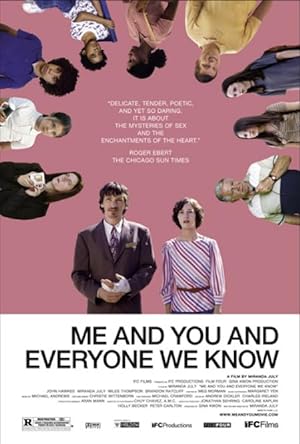Me and You and Everyone We Know shows that if you work really hard, be yourself and put your unique perspective in a film, you can still make something crappy. I really wanted to like the film. It has a female director, a biracial family, quirkiness, modern art humor, an intergenerational cast and independent film cred. If I squinted or could overlook a few things, I may have loved it, but I did not. Lawyer me was way louder than movie loving me.
Miranda July stars and directs Me and You and Everyone We Know, but it is an ensemble cast. There are about fourteen different characters that are related to each other. The film is reminiscent of an intimate, neighborly yet simultaneously isolated Robert Altman tableau. July’s character is a driver for the elderly, trying to break into the art world and instantly becomes attracted to a shoe salesman. The shoe salesman, played by John Hawkes, is optimistically trying to bounce back from breaking up with his wife and creating a new routine with his sons. The film takes detours and devotes moments to people in their lives: the museum director and people at the museum, the elderly people, his coworker, his sons, his sons’ classmates, his new neighbors, his ex. We see snippets of her art projects. We see them arrive at the same frequency and seem to hit their stride just for reality to set in and awaken them to the normally inappropriateness of their sudden connection. The film asks whether they will find the right orbit or drift apart, and it is the dominant theme of the film: making connections, speaking the same language and not being weird.
I only have one problem.
S
P
O
I
L
E
R
S
The entire movie is flawed. No parent in his or her right mind would let his or her kids live with someone who lit their fucking hand on fire in front of the kids only moments before! I get that he did not intend to light his hand on fire, and he got the trick wrong, but HE LIT HIS HAND ON FIRE!!!!!!!! IN FRONT OF THE CHILDREN! Also I was having Emmett Till flashbacks when the two white teenage girls kept threatening to scream around the older black biracial son, which made the subsequent BJ scenario NOT feel safe or like light teenage sexual experimentation. I get that if a teenage boy gets asked to be the blind recipient in a BJ contest, he is not going to say no, but that earlier scene introduced a dangerous element, particularly for a black teenage boy, in which he would be seen as a rapist. I have no idea whether or not July intended to have a sinister subtext, but it was there.
Then there are too many stories of older women raping young boys for me to find anything poignant during the To Catch a Predator bench sequence. I get that the older woman was sweetly saying goodbye to a connection that cannot be, and she legitimately did not know that her online paramour is a 7 year old boy, but he is A SEVEN YEAR OLD BOY. She kisses him then leaves him on the bench alone! In a world where women like Mary Kay Letourneau, i.e. sexual predators, get People-style profiles for raping brown boys who are too young to consent, and instead of a crime, the media characterizes the victimization as an affair or a sexual relationship instead of PEDOPHILIA, I have to ultimately deem Me and You and Everyone We Know as too problematic in terms of race and gender, intentionally or not, for me to simply see the elusive beauty and danger inherent in all human connections. While you may want to give a chance to this hipster Altmanesque take on relationships and discount my criticism as too reactionary, even without the sensational moments, this first feature film tries too hard so I will reciprocate by suggesting that you give it a hard pass. I applaud the effort.
Side note: gratuitous goldfish death.
Stay In The Know
Join my mailing list to get updates about recent reviews, upcoming speaking engagements, and film news.




